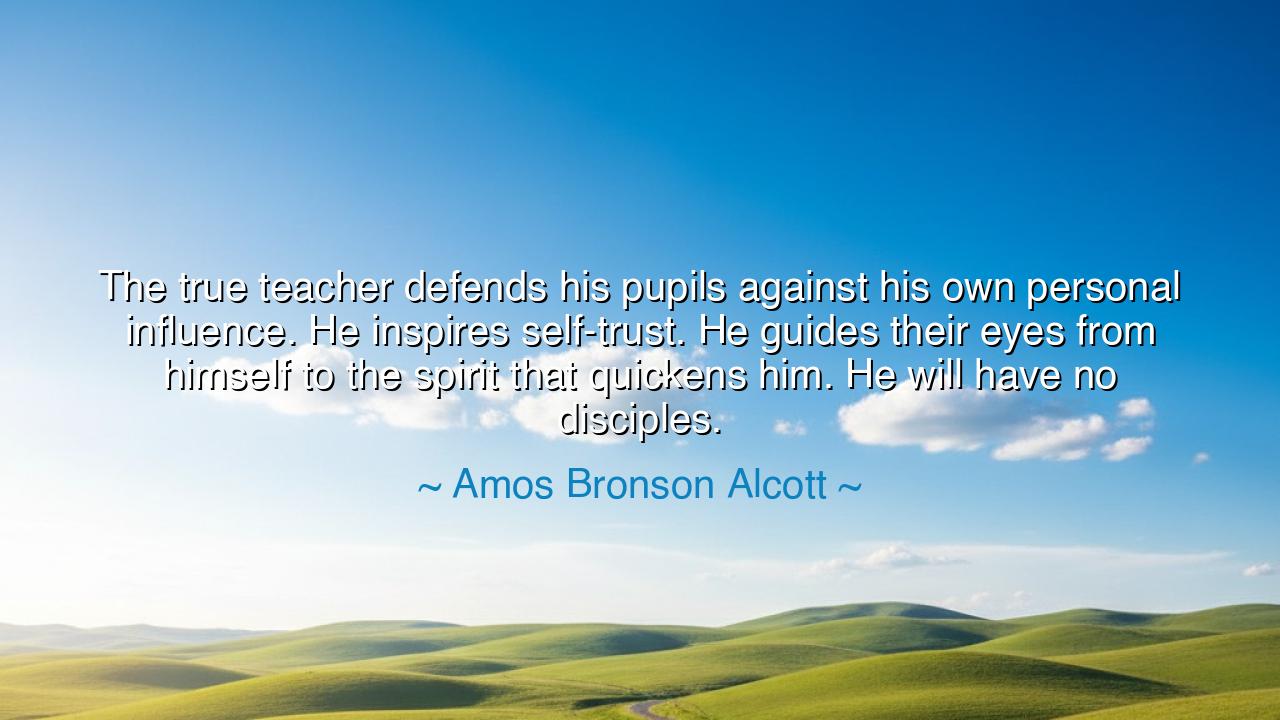
The true teacher defends his pupils against his own personal
The true teacher defends his pupils against his own personal influence. He inspires self-trust. He guides their eyes from himself to the spirit that quickens him. He will have no disciples.






Hearken, seekers of wisdom, to the words of Amos Bronson Alcott, who spoke across the ages: "The true teacher defends his pupils against his own personal influence. He inspires self-trust. He guides their eyes from himself to the spirit that quickens him. He will have no disciples." In this profound meditation, Alcott reveals the highest calling of the educator: not to mold others in his own image, but to awaken the inner light of each soul, cultivating independence, discernment, and autonomous thought.
The first lesson lies in the paradoxical wisdom that a teacher must resist imposing self. To lead by example alone is not to teach; it is to ensnare the mind in mimicry. The true teacher protects the pupil from mere imitation, knowing that the most enduring growth arises not from replication but from the cultivation of self-trust. As the ancients taught, wisdom is not a possession to be transferred, but a spark to be ignited, and the teacher’s role is to shield the flame from smothering influence.
Consider the life of Socrates, who wandered the streets of Athens not to impose his own doctrines but to awaken the reasoning of others. He asked questions, provoked reflection, and guided souls to look beyond the immediate and personal. Socrates did not amass disciples in the sense of followers bound to his likeness; rather, he inspired independent inquiry, leaving Plato, Xenophon, and others to interpret, challenge, and expand upon the truth in their own voices. Here is the embodiment of Alcott’s vision: a teacher who gives no disciples, yet leaves an eternal legacy.
Alcott emphasizes the cultivation of self-trust, a treasure beyond any external lesson. The pupil must come to believe in their own discernment, to trust their perception and judgment, even when the teacher steps aside. This is echoed in the lives of explorers and innovators, such as Marie Curie, who, though guided by mentors, relied ultimately on her own insight and perseverance to uncover the secrets of radioactivity. Her teachers offered tools, encouragement, and reflection, yet the true discoveries belonged to her alone.
Moreover, the true teacher shifts attention from self to the spirit that quickens him. In this, the educator becomes a mirror reflecting the divine essence of learning itself, the universal truths that lie beyond personality, status, or ego. To study the teacher is not to behold a man, but to perceive the principles, curiosity, and life-force that animate inquiry. This guidance toward the eternal, rather than toward the teacher’s personal shadow, forms the heart of mature education.
Alcott’s declaration, "He will have no disciples," is not a denial of influence, but a sublime humility. True guidance does not bind; it liberates. The teacher must walk unseen, for the pupil’s vision is to reach beyond the figure who instructs, to discover truth within themselves. In every age, from Confucius to modern mentors, those who achieved this balance became timeless guides, shaping thought not by imitation, but by the empowerment of autonomous insight.
From this reflection emerges a practical teaching: seek mentors who inspire, not dictate; cultivate your own judgment and discernment; honor guidance while resisting the lure of replication. For those who teach, embrace humility, restraint, and fidelity to principle, and guard against the seduction of personal veneration. The highest purpose of guidance is not devotion to the teacher, but the awakening of self-trust and independent vision.
Thus, hear this timeless lesson, echoing through Alcott’s words: the true teacher does not create followers, but awakens spirits. Look beyond those who instruct, trust the wisdom that arises within, and honor the principles that animate learning itself. In this sacred interplay of guidance and independence lies the deepest form of education—a teaching that lives eternally, not in disciples, but in the freedom, insight, and courage of the minds it ignites.






AAdministratorAdministrator
Welcome, honored guests. Please leave a comment, we will respond soon